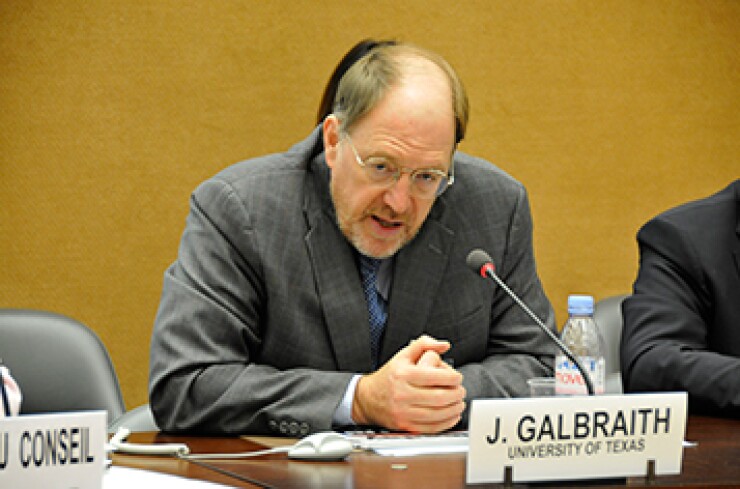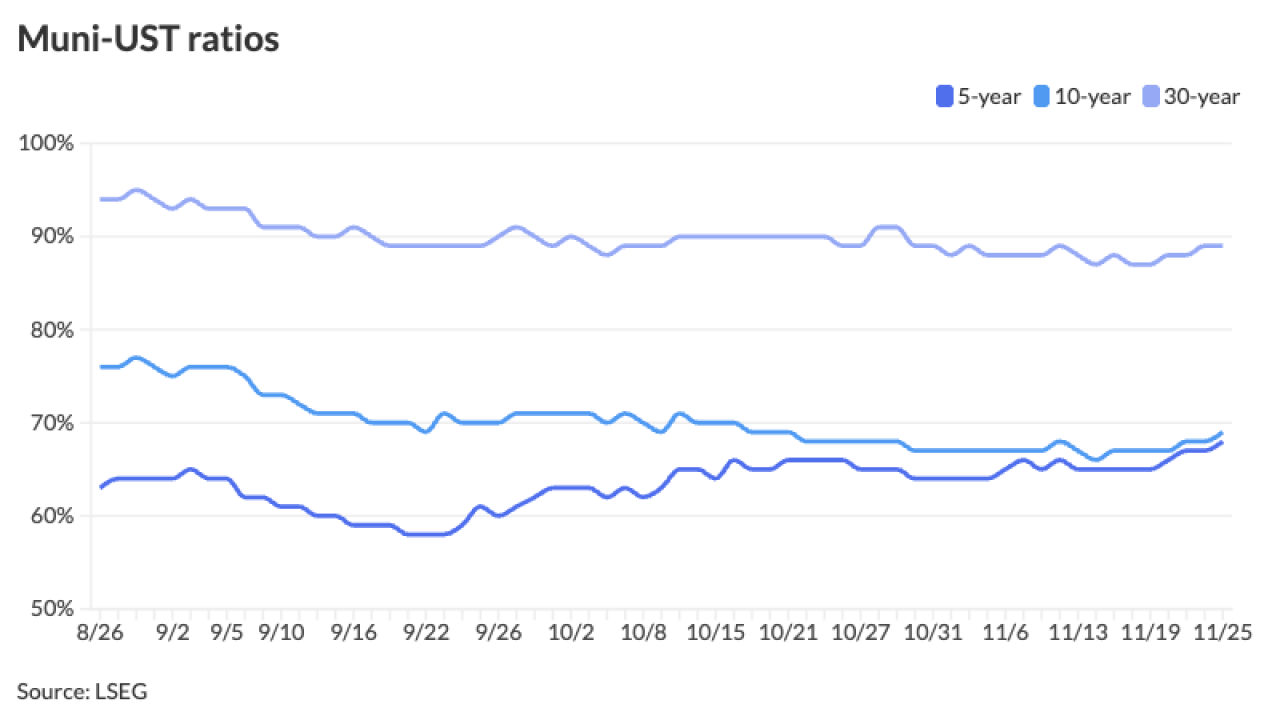
DALLAS – Wreckage from the 2008 financial crisis continues to hinder growth because little was done to repair a damaged banking system built on obsolete economic models, says University of Texas economist James K. Galbraith.
"The way the crisis was managed has created a degree of concentration that is really dysfunctional," Galbraith said in an interview with The Bond Buyer. "It gives you institutions that are very hard to control and impossible to regulate from the outside."
Considered one of the world's foremost experts on post-Keynesian economic theory, Galbraith is scheduled to deliver the keynote address at the Bond Buyer's Texas Public Finance Conference in Austin Feb. 2.
In Galbraith's view, the Fed's decision to keep interbank lending rates close to zero for nearly a decade "was part of the strategy of keeping the banks solvent. The long-term rates also came down. In that situation you get stuck, flattening the yield curve, and when you raise rates, that seems to cause havoc."
At the University of Texas, Galbraith holds the Lloyd M. Bentsen Chair in government and business relations at the Lyndon B. Johnson School of Public Affairs. He also heads the highly regarded University of Texas Inequality Project.
Although Galbraith describes himself as a "Happy Keynesian," he has used some of the harshest language of any economist in condemning the policy decisions from the Clinton era through the Bush and Obama administrations.
"It is worth remembering that the resolution of the savings and loan scandal saw more than a thousand industry insiders indicted, prosecuted, convicted, and imprisoned," Galbraith wrote in his 2014 book "The End of Normal."
"So far in the workout of the Great Crisis, the comparable number of senior bankers most responsible indicted is: zero," he wrote.
Galbraith uses the term "Great Financial Crisis" rather than "Great Recession" to distinguish the 2007-08 event from previous recessions.
"This was quite different," Galbraith told The Bond Buyer. "Unlike previous recessions, what happened in 2007 and 2008 was much more like what happened in 1929 and 1930."
While the Great Depression of the 1930s could be compared to a car that needed a jump start, the 2008 model needed a new transmission, Galbraith said. In hopes of restarting the car, the Federal Reserve added fuel in the form of low interest rates, all to no avail.
"Due in part to regulatory neglect – the failure to put water in the radiator and oil in the crankcase – it has suffered a transmission failure," Galbraith wrote in his 2014 book. "More gas in the engine will not make it go."
Galbraith, whose economist father John Kenneth Galbraith authored "The Great Crash 1929," among numerous other books, asserts that an updated version of the Keynesian formula employed in the 1930s and for which he advocated at the 25th Annual Milton Friedman Distinguished Lecture in March 2008 has become a non-starter.
"The institutional infrastructure, resource basis, and psychological foundation for a Keynesian revival no longer exist," he conceded in "The End of Normal."
The idea of "normal" economic growth was based on postwar expansions that became conventional thinking by the 1960s, about the time his father was working in the Kennedy Administration, Galbraith said. "Normal" ended in 2000 after Internet stocks backed by flimsy business plans evaporated, he said.
"My argument is that fraud took over the financial system because it was expedient to allow it," Galbraith wrote. "And it became expedient because of the relatively new stresses on the system – on a system that had, up until the 1970s, provided the foundations for sustained and stable economic growth."
The 1970s was a transitional time for the U.S. economy because, until then, the U.S. controlled its own oil supply. The Texas Railroad Commission was the equivalent of the Organization of Petroleum Exporting Countries in that it set quotas on how much oil could be produced in Texas and, by proxy, the U.S., Galbraith said. Oil was so cheap that economists who designed the post-war economic model did not even factor it into their outlooks.
While the U.S. suffered no immediate shortage when U.S. oil production peaked in 1970, "the price could no longer be controlled by a public authority inside the United States," Galbraith wrote. "When oil prices surged, purchasing power drained from the industrial West, plunging the oil consumers into recession."
The "choke-chain" effect of oil could be felt when prices reached a record $148 per barrel in July 2008, two months before the collapse of Lehman Brothers. By the end of that year, the price would fall about 80% to around $30, roughly the price it hovers near now.
Galbraith said the "choke-chain principle" could be seen again when oil fell from $108 per barrel in 2014 to current lows, moves that recently triggered a selling spree in the equities markets and flight to safety in the bond market. Wary investors in 2016 are keeping a sharp eye on China as a potential economic domino.
After the 2003 invasion of Iraq backfired into widespread upheaval in the Middle East, the U.S. lost another of its economic weapons, Galbraith argues. The 2000s brought "the realization that military superiority no longer brought enduring economic benefits," he wrote.
"And yet the expectation of steady growth and high profitability still remained, powerfully embedded in the national psyche," he wrote. "In this environment, financial fraud was not merely an incidental feature. It was the solution to a political problem."
The phenomenon of looting occurred in the later stages of the mortgage-backed securities collapse, Galbraith said.
"The economy stumbled forward until it could no longer do so," he wrote. "And then all hell broke loose."
Rescuing investment banks through mergers with commercial banks and propping them up with taxpayers' money brought few public dividends, Galbraith says.
"The destruction cannot be papered over by Dodd-Frank or anything else short of rooting out the people and replacing the institutions and structures that were responsible in the first place," he told the Levy Institute Hyman Minsky Conference in New York in 2011.
"Financial instruments are contracts at law," he added, "and without the rule of law, the financial sector is no use to anyone except those who own it and the politicians they own."





